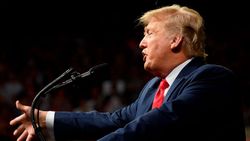 The United States Supreme Court on Thursday ruled the Manhattan district attorney can obtain President Donald Trump's tax records and Congress may not have access to his financial records for now.
The United States Supreme Court on Thursday ruled the Manhattan district attorney can obtain President Donald Trump's tax records and Congress may not have access to his financial records for now. Rasa - Court observers thought the justices might combine the two cases - they have not - ruling in favour of release in one case and sending the second, involving US Congressional requests, back to a lower court, Al-Jazeera reported.
The court upheld New York prosecutor Cyrus Vance's demand for Trump's tax returns as part of a criminal investigation that includes hush-money payments to women who claim they had affairs with Trump, but the ruling does not mean the president's financial records will be immediately released.
The justices rejected arguments by Trump's lawyers and the Justice Department that the president is immune from investigation while he holds office or that a prosecutor must show a greater need than normal to obtain the records. The tax returns are being sought as part of a grand-jury investigation.
Because the grand jury process is confidential, the rulings make it likely that none of Trump's financial records will become public soon, likely not before he stands for re-election in November.
Trump's two high court appointees, Justices Neil Gorsuch and Brett Kavanaugh, joined the majority in both cases along with Chief Justice John Roberts and the four liberal justices. Roberts wrote both opinions.
"Congressional subpoenas for information from the President, however, implicate special concerns regarding the separation of powers. The courts below did not take adequate account of those concerns," Roberts wrote in the congressional case.
The ruling returns the case to lower courts, with no clear prospect for when the case might ultimately be resolved. The tax returns case is also headed back to a lower court.
The justices heard arguments in the two cases by telephone in May.
Trump's lawyers argued at the time that a president cannot be investigated while he holds office, suggesting a ruling validating the subpoenas would open the door to harassing future presidents.
The president claimed he was being treated differently - suggesting in a tweet courts have given previous presidents "broad deference".
"This is a tremendous victory for our nation's system of justice and its founding principle that no one - not even a president - is above the law," said Manhattan District Attorney Cyrus Vance, a Democrat, in relation to the ruling in his case.
The cases resemble earlier disputes over presidents' assertions that they were too consumed with the job of running the country to worry about lawsuits and investigations. In 1974, the justices acted unanimously in requiring President Richard Nixon to turn over White House tapes to the Watergate special prosecutor. In 1997, another unanimous court allowed a sexual harassment lawsuit to go forward against President Bill Clinton.
In those cases, three Nixon appointees and two Clinton appointees, respectively, voted against the president who chose them for the high court.
Appellate courts in Washington, DC and New York ruled that the documents should be turned over, but those rulings were put on hold pending a final court ruling. The appellate decisions brushed aside the president's broad arguments, focusing on the fact that the subpoenas were addressed to third parties asking for records of Trump's business and financial dealings as a private citizen, not as president.
House committees want records from Deutsche Bank and Capital One, as well as the Mazars USA accounting firm. Mazars is also the recipient of a subpoena from Manhattan District Attorney Cyrus Vance Jr.
Two congressional committees subpoenaed the bank documents as part of their investigations into Trump and his businesses. Deutsche Bank has been one of the few banks willing to lend to Trump after a series of corporate bankruptcies and defaults starting in the early 1990s.
Vance and the House Oversight and Reform Committee sought records from Mazars concerning Trump and his businesses based on payments Trump's then-personal lawyer, Michael Cohen, arranged during the 2016 presidential race to keep two women from airing their claims of extramarital affairs with Trump.
Trump sued to block the subpoenas. He was represented by personal lawyers at the Supreme Court, and the Justice Department supported the high-court appeal.